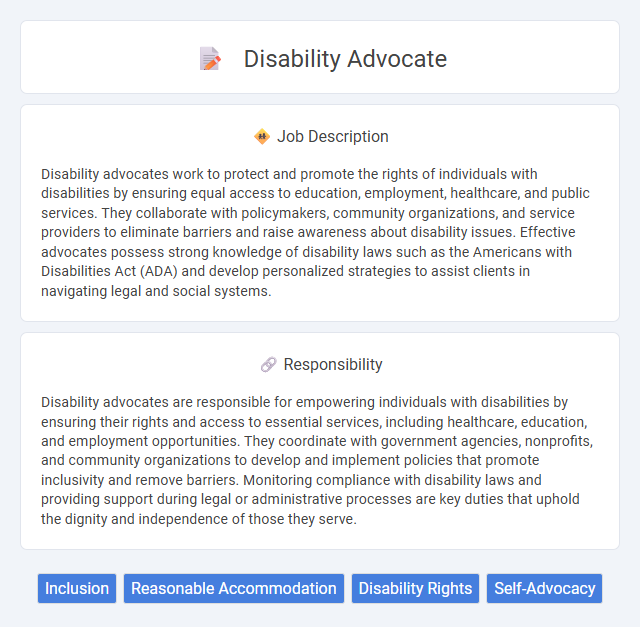
Disability advocates work to protect and promote the rights of individuals with disabilities by ensuring equal access to education, employment, healthcare, and public services. They collaborate with policymakers, community organizations, and service providers to eliminate barriers and raise awareness about disability issues. Effective advocates possess strong knowledge of disability laws such as the Americans with Disabilities Act (ADA) and develop personalized strategies to assist clients in navigating legal and social systems.
Individuals with strong empathy and communication skills are likely suitable for a disability advocate role, as the job involves supporting people with various disabilities and navigating complex systems. Those who can effectively understand and represent the needs of individuals with physical, intellectual, or sensory impairments may find this work fulfilling and impactful. However, the role may be challenging for those who struggle with high-stress situations or require extensive technical knowledge of disability laws and regulations.
Qualification
Disability advocates must possess a deep understanding of disability rights laws such as the Americans with Disabilities Act (ADA) and the Individuals with Disabilities Education Act (IDEA). Strong communication skills and the ability to navigate healthcare, legal, and social service systems are essential for effectively representing clients. A background in social work, psychology, or law often enhances an advocate's qualifications, while certification from organizations like the National Association of Disability Representatives (NADR) can provide additional credibility.
Responsibility
Disability advocates are responsible for empowering individuals with disabilities by ensuring their rights and access to essential services, including healthcare, education, and employment opportunities. They coordinate with government agencies, nonprofits, and community organizations to develop and implement policies that promote inclusivity and remove barriers. Monitoring compliance with disability laws and providing support during legal or administrative processes are key duties that uphold the dignity and independence of those they serve.
Benefit
Disability advocate jobs likely offer significant benefits such as promoting inclusive policies and improving access to essential services for individuals with disabilities. This role probably enhances personal fulfillment through meaningful impact on community well-being and social justice. Employers may provide competitive compensation packages and opportunities for professional growth in a purpose-driven field.
Challenge
Disability advocates likely face significant challenges when addressing systemic barriers and ensuring equal access to resources for individuals with disabilities. Navigating complex legal frameworks and overcoming societal stigma may require persistent effort and nuanced communication skills. The probability of encountering resistance from institutions or stakeholders could be high, demanding resilience and strategic problem-solving.
Career Advancement
Disability advocates play a critical role in promoting accessibility, inclusion, and equal rights for individuals with disabilities. Career advancement in this field often involves acquiring specialized certifications, gaining experience in policy development, and expanding networks within nonprofit organizations and government agencies. Leadership roles such as program director or policy advisor offer opportunities to influence systemic change and shape disability legislation.
Key Terms
Inclusion
Disability advocates play a crucial role in promoting inclusion by ensuring equal access and opportunities for individuals with disabilities in education, employment, and public services. They work closely with organizations and policymakers to remove barriers and develop inclusive programs that respect the rights and dignity of people with disabilities. By fostering awareness and advocating for systemic changes, disability advocates help create environments where diversity and inclusion are integral to community and workplace culture.
Reasonable Accommodation
Disability advocates specialize in ensuring reasonable accommodation in workplaces and educational institutions, facilitating equal access and opportunity for individuals with disabilities. They assess barriers, recommend tailored modifications such as adaptive technologies or flexible schedules, and navigate legal frameworks like the Americans with Disabilities Act (ADA). Their expertise promotes inclusive environments by informing policy enforcement and supporting clients through mediation and advocacy processes.
Disability Rights
Disability advocate jobs focus on promoting and protecting the rights of individuals with disabilities through legal support, policy development, and public education. These professionals work closely with organizations such as the Americans with Disabilities Act (ADA) and the United Nations Convention on the Rights of Persons with Disabilities (CRPD) to ensure compliance and accessibility. Effective disability advocates implement inclusion strategies, fight discrimination, and provide resources to empower people with disabilities in social, educational, and employment environments.
Self-Advocacy
Disability advocates specializing in self-advocacy empower individuals with disabilities to understand their rights, communicate their needs, and make informed decisions. They provide training and resources that promote autonomy, enhance self-confidence, and encourage active participation in personal and community decision-making. Effective self-advocacy leads to improved access to services, inclusive policies, and greater societal inclusion for people with disabilities.
 kuljobs.com
kuljobs.com